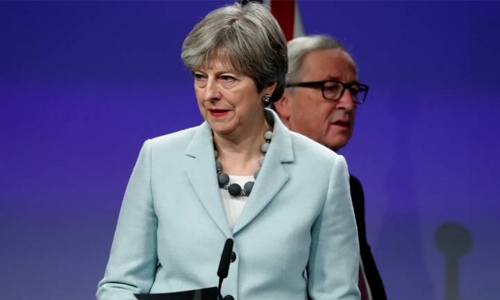Hold a second brexit referendum
A democracy that cannot change its mind is not a democracy. The people may do that when presented with the whole picture after seeing only a partial or distorted one. It has taken more than 30 months to shift from “Fantasy Brexit” to “Reality Brexit.” The difference, after vitriolic debate that has consumed British politics virtually to the exclusion of all else, is stark. The first was Britain’s 2016 vote, fuelled by lies, to leave the European Union, trumpets blaring.
The second, after a crash course in the facts of what membership brings for Britain, came Tuesday in the form of the crushing defeat by a 432-to-202 parliamentary vote of Prime Minister Theresa May’s plan for British withdrawal on March 29. This, of course, was not a vote to remain in the European Union after all. It reflected anger across ideological lines that united Conservative lawmakers who want a complete British break from Europe and representatives of other parties who want to remain in the 28-nation union.
Above all, it reflected complete disarray, the incapacity of May or anyone to come up with an acceptable compromise deal to accomplish something so inherently undesirable as to defy prettification. The vote, the most overwhelming defeat for a prime minister in recent British history, makes it more likely that the March 29 deadline will not be met. It also makes it more likely, if not yet probable, that a second referendum will be held. As Timothy Garton Ash, the British historian and author, tweeted from Parliament: “This increases chances of #peoplesvote and Britain remaining where it belongs … in Europe.” Resistance to a second vote is ferocious.
We are told it would split Britain in two for generations, leave blood on the streets,render the expression of the people’s will meaningless, and even destroy British democracy. But Britain is split one way or another and not about to heal. It voted in 2016 on make-believe shamelessly peddled by the likes of the former foreign secretary Boris Johnson. At stake is the country’s direction for decades to come. It’s worth voting on the facts, not some post-truth phantasmagoria, of a British exit. The unicorn of little English dreams turned out to be nonexistent.
Recent polls suggest that British citizens now favour a second vote and that, if held, the decision to leave would likely be overturned. Other union countries, including Denmark and Ireland, have voted twice on European Union treaties and reversed the initial outcome. They are still thriving democracies, as far as anyone can tell. People change their minds and survive. The road from here to a second vote is no straight line but its trajectory is at least discernible. Jeremy Corbyn, the Labour Party leader, called for a vote of no confidence in May’s government, which May narrowly survived 325-306 on Wednesday.
Then, later this week, the parliamentary maneuvering will begin under a 10-week deadline to March 29. The backdrop to the maneuvering is this. The European Union has said the only deal is the one May tabled. That deal was a fudge in extremis leaving Britain inside the European single market until a new trade relationship is worked out; it reflected May’s recognition that a no-deal Brexit would be an economic disaster. This compromise, in turn, infuriated many in her Conservative Party. Two Brexit secretaries quit last year over the agreement negotiations.
The bill for the divorce, which Britain agreed to under May’s rejected plan, would be about $50 billion, or about eight of Donald Trump’s walls. Corbyn’s Labour Party, but not Corbyn himself, favours staying in the European Union; presumably Corbyn will eventually come around, in the absence of any viable alternative. Britain is a parliamentary democracy. As Hugo Dixon, the deputy chair of the People’s Vote, a grass-roots movement for a second referendum, wrote in the French daily Le Monde: “Parliament will need to pass a new law to authorise this referendum.
It can do this either the easy way, with prime minister’s support; or the hard way, by forcing it through against her wishes.” Dixon told me that a “Remain” campaign in a second referendum would need to focus on the real issues that caused the Brexit vote: immigration, the areas of Britain starved of investment and left behind, a deficient National Health Service. None of these problematic issues were caused by the European Union. “In fact,” he said, “they are best addressed in Europe, with an economy given a boost by a decision to remain and a political agenda no longer consumed by Brexit.”
There are no good solutions to the current impasse but a second referendum is the least bad. All the debate has come up against a stubborn fact: Brexit is damaging to the British national interest. No deal can make it look good. May tried and failed. The British, and particularly British youth, deserve the right to determine their longterm future on the basis of reality.
Related Posts

